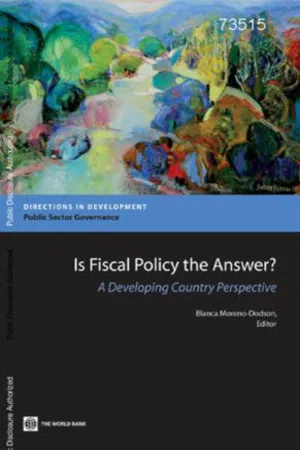
- 285 pages
- English
- PDF
- Available on iOS & Android
Is Fiscal Policy the Answer? A Developing Country Perspective
About this book
Fiscal policy is an important instrument for maintaining and improving living standards. Such living standards can be viewed as an outcome of the interaction between the opportunities offered by society and the readiness and ability of each person to exploit them. Under certain circumstances, public finance can make an important contribution to the creation of opportunities within a given society by raising resources from the private sector through taxation or borrowing (domestic and external) and allocating those resources effectively and equitably in the form of public spending, including through public goods and transfers. The first chapters in this volume sketch out a framework that policy makers can use in adopting a more cohesive or integrated approach to the short- and long-term dimensions of fiscal policy. Here the traditional threefold rationale for fiscal policy proposed by Musgrave-stabilization, resource allocation, and distribution-continues to be useful. Other chapters in this volume take up some of the critical institutional challenges in implementing fiscal policy for longer-term growth and development. These chapters also look at the tools and approaches being developed to address these challenges. Improving the quality of public investment management is a particular priority in view of the recent evidence that as little as half of all public investment expenditure translates into productive capital stock. The last chapter in this volume is a case study of fiscal responses to the great recession in low-income Sub-Saharan Africa, looking at stabilization and the longer-run growth, as well as distributional aspects of such responses. The growing depth of domestic financial markets in many African countries rather unexpectedly is turning out to be a critical source of financing for fiscal policy responses.
Information
Table of contents
- Cover
- Contents
- Foreword
- About the Editor and Authors
- Acknowledgments
- Abbreviations
- Overview: Fiscal Policy for Growth and Development
- Chapter 1 Fiscal Policy for Growth and Social Welfare
- Chapter 2 Public Spending and Long-Run Growth in Practice: Concepts, Tools, and Evidence
- Chapter 3 Public Investment Management Challenges and Tools
- Chapter 4 Fiscal Policy for Sustainable Development in Resource-Rich Low-Income Countries
- Chapter 5 Analyzing the Distributive Effects of Fiscal Policies: How to Prepare (Analytically) for the Next Crisis
- Chapter 6 Fiscal Policy Lessons in Sub-Saharan Africa from the 2008–09 Global Crisis
- Afterword
- Boxes
- Figures
- Tables
Frequently asked questions
- Essential is ideal for learners and professionals who enjoy exploring a wide range of subjects. Access the Essential Library with 800,000+ trusted titles and best-sellers across business, personal growth, and the humanities. Includes unlimited reading time and Standard Read Aloud voice.
- Complete: Perfect for advanced learners and researchers needing full, unrestricted access. Unlock 1.4M+ books across hundreds of subjects, including academic and specialized titles. The Complete Plan also includes advanced features like Premium Read Aloud and Research Assistant.
Please note we cannot support devices running on iOS 13 and Android 7 or earlier. Learn more about using the app